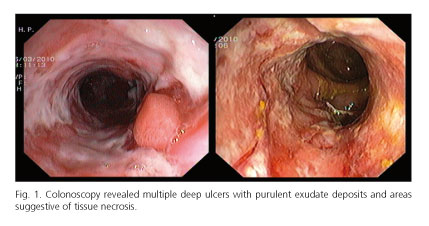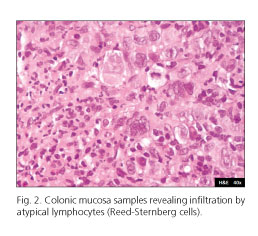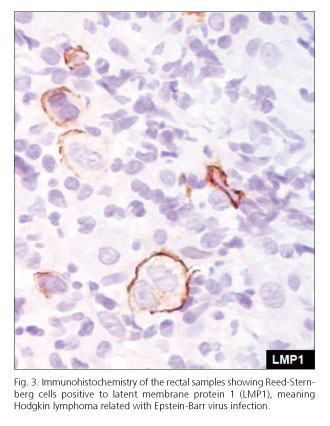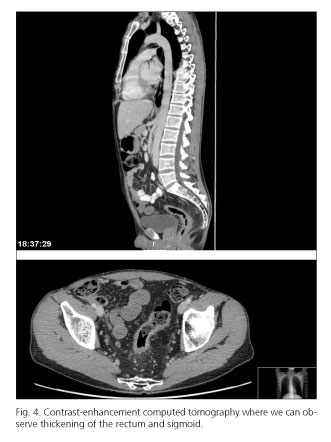Mi SciELO
Servicios Personalizados
Revista
Articulo
Indicadores
-
 Citado por SciELO
Citado por SciELO -
 Accesos
Accesos
Links relacionados
-
 Citado por Google
Citado por Google -
 Similares en
SciELO
Similares en
SciELO -
 Similares en Google
Similares en Google
Compartir
Revista Española de Enfermedades Digestivas
versión impresa ISSN 1130-0108
Rev. esp. enferm. dig. vol.105 no.5 Madrid may./jun. 2013
https://dx.doi.org/10.4321/S1130-01082013000500008
PICTURES IN DIGESTIVE PATHOLOGY
Primary intestinal Hodgkin's lymphoma associated with Crohn's disease
Linfoma Hodgkin intestinal primario asociado a enfermedad de Crohn
Paulo Salgueiro1, Paula Lago1, Pedro Farrajota2, Marisa Santos3 and Isabel Pedroto1
1Departments of Gastroenterology
2Pathology and
3General Surgery. Hospital Santo António. Porto, Portugal
Case report
The authors present the case of a 37-years-old man with pancolic Crohn's disease (CD) diagnosed 20 years ago, characterized by a penetrating behavior with need for surgery (segmental colon resection) for a colovesical fistula. Due to a corticodependent evolution, the patient has been in treatment with azathioprine for 8 years, with only partial clinical response, reason why he started infliximab (treatment continued for 3 years). An acute exacerbation prompted a colonoscopy that revealed severe inflammatory activity within the distal sigmoid and rectum with no changes in the remaining colonic and ileal mucosa (Fig. 1). Biopsies revealed infiltration of the mucosa by classic Hodgkin's lymphoma (Fig. 2), with positivity for Epstein-Barr virus (Fig. 3) and severe inflammatory activity. Computed tomography (Fig. 4) and bone marrow aspirate excluded extra intestinal lymphoproliferative disease (LD). After multidisciplinary consultation, the patient underwent total colectomy plus abdominoperineal resection of rectum (Fig. 5) with permanent ileostomy, the main indication was based on the lack of response to the medical therapy for CD. Since the resected specimen had no evidence of involvement of the isolated lymph nodes, it was decided not to start any adjunctive therapy.
Primary intestinal Hodgkin's lymphoma is very rare presenting an incidence of less than 0.5 % (1). Its association with CD is even rarer, with only sporadic cases described in literature (2).
There are still doubts whether the pathogenesis of the increased risk of LD in patients with CD correlates with the inflammatory disease activity or with the immunosuppressive treatment (3,4). The identification of Epstein-Barr virus infection in patients with Hodgkin's lymphoma is often reported in the described cases, suggesting that this agent might be implicated in the pathogenesis of the LD (5).
References
1. Askling J, Brandt L, Lapidus A, Karlén P, Björkholm M, Löfberg R, et al. Risk of haematopoietic cancer in patients with inflammatory bowel disease. Gut 2005;54:617-22. [ Links ]
2. Castrellon A, Feldman PA, Suarez M, Spector S, Chua L, Byrnes J. Crohn's disease complicated with primary gastrointestinal Hodgkin's lymphoma presenting with small bowel perforation. J Gastrointestin Liver Dis 2009;18: 359-61. [ Links ]
3. Beaugerie L, Brousse N, Bouvier AM, Colombel JF, Lémann M, Cosnes J, et al. Lymphoproliferative disorders in patients receiving thiopurines for IBD: A prospective observational cohort study. Lancet 2009;374:1617-25. [ Links ]
4. Siegel CA, Marden SM, Persing SM, Larson RJ, Sands BE. Risk of lymphoma associated with combination anti-tumor necrosis factor and immunomodulator therapy for the treatment of Crohn's disease: A meta-analysis. Clin Gastroenterol Hepatol 2009;7:874-81. [ Links ]
5. Kumar S, Fend F, Quintanilla-Martinez L, Kingma DW, Sorbara L, Raffeld M, et al. Epstein-Barr virus-positive primary gastrointestinal Hodgkin's disease: Association with inflammatory bowel disease and immunesuppression. Am J Surg Pathol 2000;24:66-73. [ Links ]



















